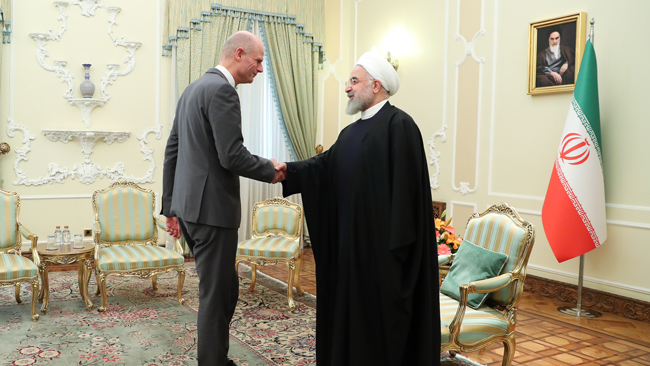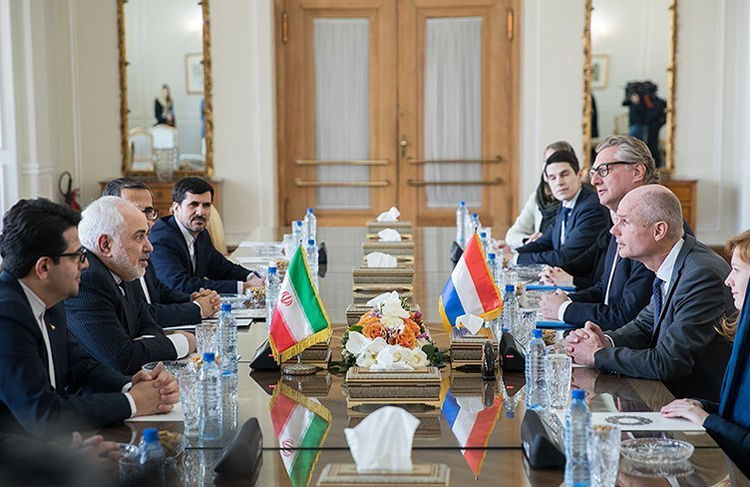Iran President says the country has not closed the door to negotiations with Europe on possible ways to save the 2015 Iran nuclear deal.
"We believe that the nuclear deal served the interests of the region and the world and the US move [to leave the deal] harms all nations and even the American people," President Hassan Rouhani said in a meeting with Dutch Foreign Minister Stef Blok in Tehran on Saturday.
Over the past 21 months since the US exit from the Joint Comprehensive Plan of Action (JCPOA), the European Union has failed to take effective steps in line with fulfillment of its commitments, President Rouhani added.
Pointing to the US’ “illegal, unilateral and cruel” sanctions against the Iranian nation, which also include medicine and food, Rouhani said, "It is expected that the world’s free nations vociferously condemn these unlawful sanctions."
US President Donald Trump, a stern critic of the historic deal, unilaterally pulled Washington out of the JCPOA in May 2018, and unleashed the “toughest ever” sanctions against the Islamic Republic in defiance of global criticism in an attempt to strangle the Iranian oil trade.
In response to the US’ unilateral move, Tehran has so far rowed back on its nuclear commitments five times in compliance with Articles 26 and 36 of the JCPOA, but stressed that its retaliatory measures will be reversible as soon as Europe finds practical ways to shield mutual trade from the US sanctions.
Tehran has particularly been disappointed with failure of the three European signatories to the JCPOA Britain, France and Germany to protect its business interests under the deal after the US withdrawal.

Netherlands will make efforts to save JCPOA: Blok
Foreign Minister of the Netherlands Stef Blok said his country would make efforts to preserve the JCPOA and stressed the importance of continuing dialog as a means of solving problems.
Blok added that Amsterdam has openly and privately told the Americans that their move to withdraw from the JCPOA, which is an international agreement, was not the right thing to do.
The Dutch top diplomat’s visit to Iran comes as relations between the two countries have soured in the past few years following the expulsion of two Iranian diplomats from the Netherlands in June 2018 and Tehran’s reciprocal measure in February 2019.
He also called for the promotion of relations between the two countries in all fields, particularly in the economic sector, and expressed hope that the Netherlands would be able to play a more dynamic role in the implementation of a non-dollar direct payment channel, officially called the Instrument in Support of Trade Exchanges (INSTEX) which was unveiled by the three European signatories of the JCPOA late January 2019.
In its initial stage, INSTEX was supposed to facilitate trade of humanitarian goods such as medicine, food and medical devices, and later be expanded to cover other areas of trade, including Iran’s oil sales. However, it has not resulted in any trade deals so far.
.jpg)
Dutch foreign minister on mission to the Middle East
Earlier in the day, Blok held two rounds of talks with his counterpart Foreign Minister Mohammad Javad Zarif about issues of mutual interest and the latest regional and international developments.

He also visited the central Iranian city of Isfahan on Friday, where he talked with the governor of the city and visited cultural and historical monuments there.
According to Iranian Foreign Ministry Spokesman Abbas Mousavi, Austrian foreign minister will also visit Tehran to discuss bilateral ties as well as international and regional issues, mainly the fate of the JCPOA and peace in the Persian Gulf region.
The Dutch foreign minister is also scheduled to pay visits to Saudi Arabia and the United Arab Emirates for consultations to help de-escalate tensions in the Middle East.